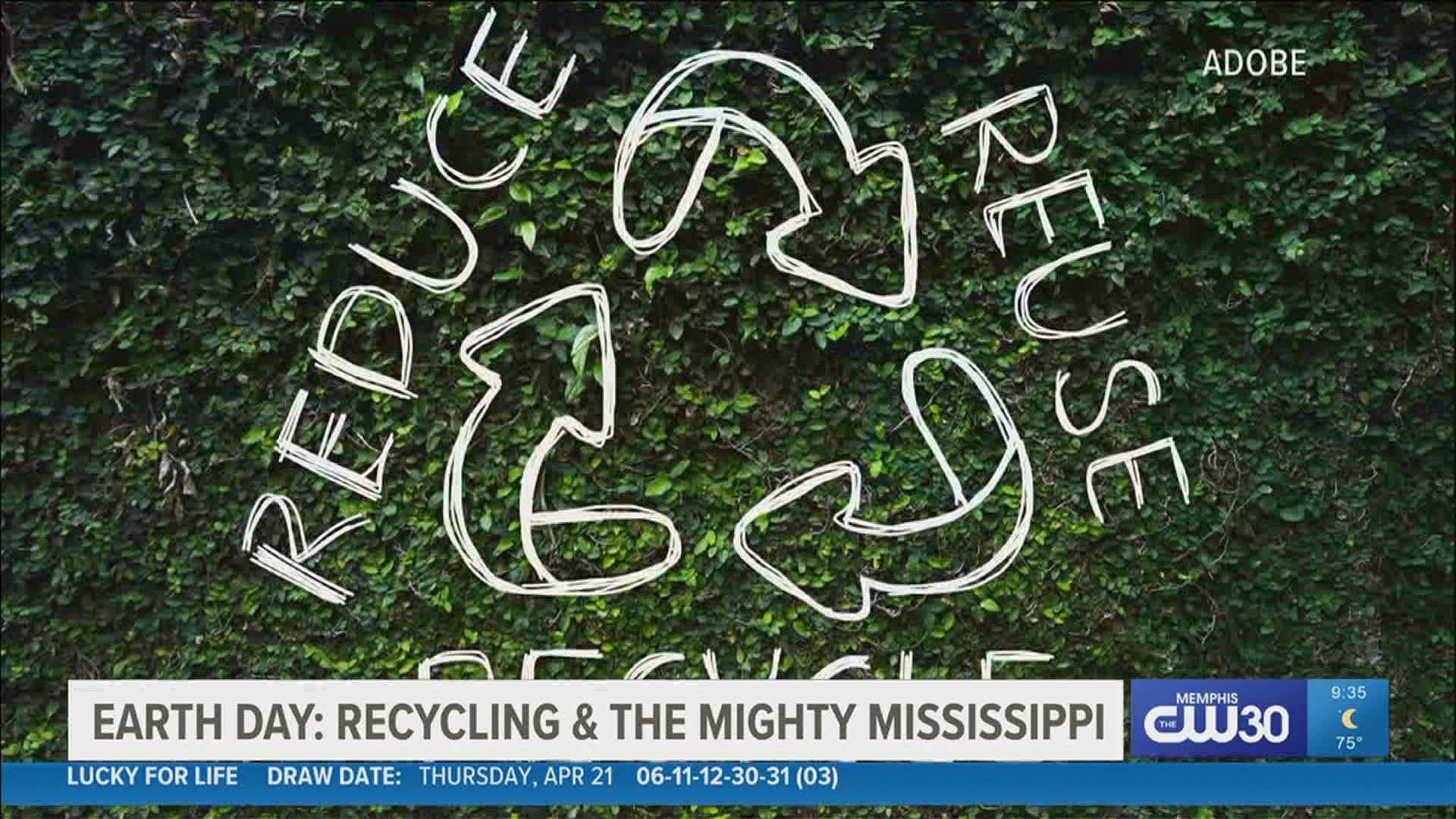MEMPHIS, Tenn. — One of the most popular ways to save our planet is…recycling. From sorting your trash to using reusable straws, there are many ways things that you can do to contribute to a clean environment. It’s NOT a new concept. Reduce…Reuse…Recycle…it’s a phrase that you’ve heard a million times. But, what does it mean? How can it help me directly? Are Memphians really recycling? Let’s find you some answers!
We took a ride down to Mud Island to find the second most used recycling center in Memphis. Amanda Fryer, the city of Memphis Recycling Administrator says, “So, you see that these are all 30 cubic yard containers. They’re emptied on a daily basis. So, we receive a nice amount of tonnage from this facility. They are being emptied daily.”
Since 2015, the city of Memphis has offered residents the option to recycle curbside using their 96 gallon carts.
More than 182,000 Memphis households have access to the Memphis curbside recycling program.
Even if you do not have curbside recycling access, you can still do your part by recycling at the convenience centers throughout the city.
Cans, cartons, and glass can all be dropped off there and with cookout season approaching, you can also recycle aluminum pans. Just make sure that all of the food is cleaned off.
Memphis isn’t the only place in the Volunteer State that’s recycling. The Tennessee Aquarium is encouraging Tennesseans to love the land they are in and protect all of our beautiful rivers. From the merchandise that they sell in their gift shop, to the new Washed Ashore exhibit that repurposes litter into art, they are really driving their point home.
Natali Rodgers, the Director of Learning and Evaluation at the Tennessee Aquarium says, “It really shows what’s going on with microplastics in our waterways and helping us to better understand that literally there’s 100 million of pieces of trash just on the roadways of Tennessee Aquarium and just giving us the tips and tricks of what can we do to minimize that. What can we do as human beings to be able to alter change our behavior?”
Wanting change is what inspired the Washed Ashore artist in the first place. An art teacher in Oregon who wanted to stop the littering in her own town.
Brad Parks, the Director of Conservation and Education for Washed Ashore says, “Over time, she realized that this could be a way for me to help contribute to the cleanup. But to also create sculptures that really raise awareness and make people aware of this issue that is becoming a bigger and bigger problem.”
The lack of recycling has become a bigger problem for organisms in our rivers which in turn, is becoming a larger problem for those of us that consume them.
According to the Mississippi River Cities and Towns Initiative, the Mississippi River provides drinking water to more than 20 million people and 50 cities, including Memphis
Shelby County says that our drinking water is one of the best in the United States and recycling will help keep that statement true.
The ugly truth is that we must also REDUCE our use of microplastics which can be found in the everyday items that we use.
“Sometimes, the microplastics, that we probably don’t even realize that we’re using, we are intentionally creating those for some of the products that we are using. Everything from your makeup, to your body wash, to exfoliating body wash, exfoliating toothpaste, all of those items, including down to the clothes that we wear, have microplastics”, adds Rogers.
If fish consume microplastics, and we consume the fish, then the old saying is correct…”You are what you eat”.
Parks says, “When you think of ocean conservation, especially inland like this, in a place like Tennessee, Chattanooga, Memphis, this part of the country, we are a little bit distant from the ocean. But really, the ocean brings so much life into the landmass, through creating oxygen is one huge thing that we get from creatures living in the ocean. But in the end, unfortunately our plastic use and the way that we dispose of our trash here on the land is impacting the health of wildlife in the ocean.”
Back at home, Recycle Memphis is also working on REUSING some of the organic waste that we create. What classifies as organic waste?
"Organic waste is your leftovers. It’s the food that you eat. All of that material, that organic waste, along with, which is also called organic waste but, it’s the branches that we pick up at the curb. All of that is no longer going to a landfill to deteriorate and decay. It is turned or recycled into something else that can help your garden grow or help with larger Agricultural sites or landscaping companies”, says Fryer.
The city of Memphis will be having a mulch giveaway on Saturday April 23rd and on Saturday May 7th.
You just need proof that you are a Shelby County resident.
Fryer says, “I like to remind our residents that everything that you throw away, goes somewhere. It just doesn’t leave your view and it disappears. It ends up somewhere. So, the more that we use facilities like this, the more that we recycle in our containers, our grey carts, the more we keep out of those landfills and don’t have to build another one.”
If you would like to start recycling at your home, you can purchase a recycling bin from the city of Memphis. Also, check your MLGW bill because you might already be paying for the service.
If you don't want to buy a bin, you can drop your recyclables off at three locations in the bluff.
Downtown
- Mud island Drive (north entrance of Mud island Park)
Southeast Memphis
- Hickory Hill Community Center – 3910 Ridgeway
East Memphis
- Near the Agricenter – approx. 300 yards from Germantown Pkwy South

